Podcasts can be a great way of growing an audience for your business. But is it worth your time and the cost of podcast equipment to start a podcast?
James and ValherMedia’s Charley Valher give you an overview of the current podcasting scene, what's involved in creating a show, and the factors that can spell success or make a podcast die an early death.
Podcast: Download (Duration: 53:06 — 48.9MB)
Get Notified Of Future Episodes Apple Podcasts | Spotify | Amazon Music | Android | Blubrry | Gaana | TuneIn | Deezer | Anghami | RSS | More
Episode highlights:
Let James help you create powerful marketing strategies for your business
Podcasting from the viewpoint of a connoisseur
So much is happening in the podcasting world, as ValherMedia‘s Charley Valher would know. Charley doesn’t just make a living from podcasting, it’s his passion.
And what Charley’s seen in the last 18 months is a marked increase in the number of shows occupying the space. About two and a half years ago, there were around a million active podcasts on iTunes. Now consider that, since the start of podcasting, it took 20 years to reach that stat. The most recent numbers that Charley’s seen say that we’ve since cracked two million.
It would seem a lot of people that were before doing in-person events have turned to other means of communicating and educating, podcasting being one of them.
“There’s more shows, but people are now listening to more shows, consuming more media. “
At one point, says Charley, he wondered whether this would create saturation. Would people be listening to less shows, because of a surfeit of offerings? But it’s been almost the opposite, he says. There are more shows, but people are now listening more, consuming more media.
And the popularity and demand are feeding into each other. More people are doing it because it works. It’s a really effective strategy in the current climate.
The burning question we’re looking to answer
But it does beg the question that James and Charley want to answer today: should you even start a podcast?
If you’re listening, you’re already predisposed to the concept. Maybe you’ve got recording equipment. You probably listen to other podcasts. And you may even have been a guest on a podcast.
Maybe you want to build an audience outside of Facebook ads. Or maybe you’ve even tried podcasting before, and it didn’t get off the ground. You might have gotten bogged down in tech, or trying to edit your own audio. Or the premise might have been wrong, the podcast ideas not catchy enough. Or you might not even know what content to make.
If any of this resonates, this episode is for you.
What hurdles can you expect when starting out?
Knowing the common challenges of starting a podcast might help you identify if you should or shouldn’t start your own show.
“Majority of the podcasts out there actually get abandoned after six episodes. “
Charley starts with the number one thing he’s seen: lack of commitment. An interesting thing about the two million podcasts on iTunes is the average episodes per show. SuperFastBusiness can boast at this point 833 episodes. But the average out there is six. The majority of podcasts get abandoned after six episodes.
Some people get short-term focus, says Charley, thinking they’ll put out one ep and be successful overnight. And on the back of that are a number of other challenges they see time and again.
So to succeed, it would be good to ensure that you:
1. Have good time allowances to do the show properly.
2. Create really good content
3. Stay consistent
Charley often gets asked, what does a commitment look like? How long is long term? Will it take years and years to reap the benefits? Not at all, he says. But if you don’t go into it with the intent of going hard for at least 12 months, you will probably fall short of major results.
“What chance have you really got making a great podcast episode if you’ve done no prep?”
The second thing Charley sees often is, people tend to get lazy with their content. In the beginning, for instance, they might prepare well, even read a book if the author’s on their show. Later, they might just jump on calls with people without any sort of prior research.
Charley can even tell the difference with himself. If he’s ever been lazy with an interview, he knows it hasn’t turned out as well as the ones where he came prepared. So you really need adequate time to prepare for an interview and conduct it well.
Sometimes, too, you have to be willing to do things outside of interviews to get a good episode. Charley mentions James’s Maldives ep, where James put in the effort within an overseas mastermind to record and document what went on to share with his audience.
It took some doing, says James, but the difference between his podcast and lives is that he doesn’t sacrifice his everyday living to be a performer. His episodes are planned and he know what he does and doesn’t want to share.
The kind of leverage you can achieve
One reason James has stuck with podcasting for so long is the leverage. He gets to share his message en masse, but in a convenient way. Broken down, it takes two 45-minute sessions a week to sustain a seven-figure business.
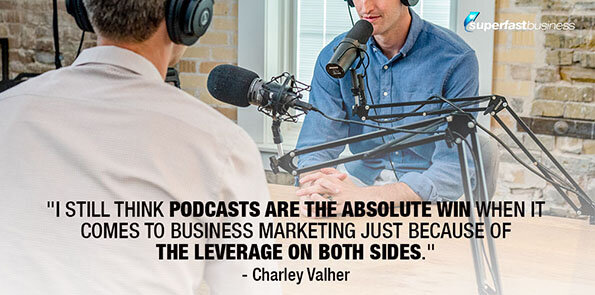 And, says Charley, those two sessions can be turned into other content, say on social media. He personally thinks podcasts are the absolute win when it comes to business marketing, just because of the leverage on both sides. You’re building recorded assets, a great library of knowledge and expertise. And then you’re also able to repurpose and repackage that into promotional leverage.
And, says Charley, those two sessions can be turned into other content, say on social media. He personally thinks podcasts are the absolute win when it comes to business marketing, just because of the leverage on both sides. You’re building recorded assets, a great library of knowledge and expertise. And then you’re also able to repurpose and repackage that into promotional leverage.
He compares this with some of the long-form, well-written content on Facebook that disappears after 24 hours. It’s a zero-leverage activity that you have to repeat every day to get a result.
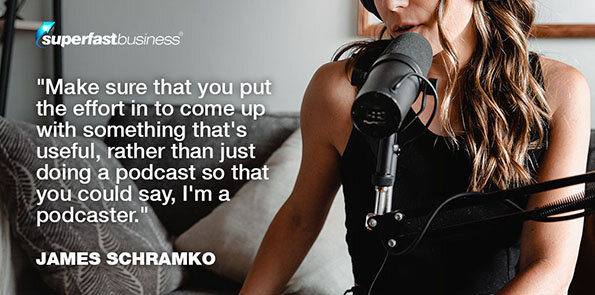 James thinks that sort of quality, story-based material would fare better as a podcast. He refers to one of Charley’s checkpoints, to make sure that you put the effort in to come up with something that’s useful, rather than just doing a podcast so that you could say, I’m a podcaster, and that you’re just doing the minimum viable.
James thinks that sort of quality, story-based material would fare better as a podcast. He refers to one of Charley’s checkpoints, to make sure that you put the effort in to come up with something that’s useful, rather than just doing a podcast so that you could say, I’m a podcaster, and that you’re just doing the minimum viable.
A look at the editing aspect of podcasts
The topic of editing podcasts comes up, because it takes much longer than most people realize.
For every hour of audio content, says Charley, it’s four hours, start to finish, to edit and polish a file. That’s with someone who knows what they’re doing and is skilled and trained.
So in James’s case, two 45-minute episodes can take six to seven hours of editing a week. Thankfully, he has a team to do it. The options really are, you have a team, or you do it yourself, or you hire a contractor. He would say, for most people, unless they are in the seven-figure business region, it’s not really worth having your own team.
Charley agrees that one’s highest and best use activity in a day is unlikely to be editing their podcast. And if you’ve read James’s book, the part about effective hourly rate, podcast editing hardly comes into it for most people.
Back when Charley was a podcasting newbie…
Charley recalls his first podcasting experience, doing something he thinks many people attempt. He had the idea that he could simply give his audio to his VA to edit. She was a general admin assistant, great at what she did, but with no skills in editing or visuals.
He thought things were going smoothly, till he realized it was taking her two and a half days in a week to edit his podcast. It just wasn’t her competency, and she was trying to learn from YouTube tutorials on the fly. It ended up, Charley said, absolutely train wrecking the delivery of other tasks within the business.
This led Charley to understand that editing is a specialized skill, and from then he’s only used trained editors to do similar work.
Good editing has some depth, says James. He has a relationship with his editor where he can ask which parts of an episode she likes, and she’ll give him feedback when his mic fades somewhere or part of the audio is missing. She chooses the best hook to put in the episode pre-reel, and ensures minimum quality levels for the overall audio.
Bits from James’s archive of failures
James has had his share of podcast fails, he says. The worst he can remember is when he had a Hollywood actor do a walk through a set and some studios, with other famous people on the recording. They finished up, James hit stop, and the device started recording. He’d lost the whole thing.
Then there was the tragic recording with Jay Abraham. After six or seven reschedulings, James finally got him. But James was in the Philippines, and they waited almost four or five hours to get good internet. They recorded and had to chop out some bits, the quality was so poor. But the guest was hard to get, and it was an important episode, so they published it anyway.
The point, says James, is if you’re going to do a podcast, it’s not going to be an easy run. There will be challenging times. You’ll have challenging guests, you’ll have challenging scenarios, and you will lose recordings.
When the magic of it just starts to fade
One of the big problems that Charley touched on before is that excitement in podcasting can tend to fade.
In the beginning things are new and flashy; there are toys like microphones, and other people are involved. It’s very enticing for some people.
Then over time, it starts to impinge on other activities. Maybe you’ve got a big week of work coming up and you’re trying to squeeze in a recording. This is when newcomers to the game start to go, Am I getting results from this? Or should I be focusing on something else?
And because they’re not enjoying the harvest from their podcast yet, that normally ends up the thing that gets compromised. And lack of effort leads to lack of more effort, and in turn, they go to what people call in the industry pod fading. People will just dwindle out and pod fade.
Indicators that you should really not do a podcast
If Charley were to push people off the fence altogether, who really should not be doing a podcast?
1. You’re very limited on time and have inconsistent ability to record. Maybe you travel a lot or can’t batch record. Then just don’t do it.
2. If you want to really do a podcast that you want to create, instead of a podcast that an audience wants to consume, just don’t do it. Or do it for fun as a hobby; don’t bring it into your business.
3. If you’ve got absolutely no funds for equipment – if you’re not going to buy a podcasting microphone, or get a camera of some kind, or invest in that type of technology, then it’s going to be a very difficult thing. As well as more shows coming in, standards have definitely gotten higher.
If you’re the type of person that doesn’t like being on camera, and doesn’t like doing podcasting, you probably shouldn’t do it either.
4. If you’re trying to do a podcast, but you have nothing to sell, or no way of bringing it into a business or there’s no value to areas that are important to you, you probably shouldn’t do it.
James adds the person who thinks they’ll make all their money from publishing ads, straight out of the gate. You need to already be famous in some way if you plan to do that.
If you’re not already famous and you don’t want to make the money off the publishing, you need to have an affiliation or your own products or services. James thinks podcasts are not for someone who’s starting absolutely cold (you don’t know what you’re selling, you don’t know who you’re selling it to, you’re not famous, you’ve got no list, you’ve got no budget, you’ve got no time).
“The good news is, if podcast is not for you, there’s plenty of other things you could do. “
The good news is, if podcasting is not for you, there’s plenty of other things you could do. You can do your long-form Facebook posts, you can do videos.
What kind of investment would you be looking at?
What kind of budget would you need for time and podcast equipment?
If you were to do it yourself, says Charley, you’d need to allow one day a week for creating your content, and then editing and publishing. So if you’re doing a one-a-week show, and maybe you’re recording about 45 minutes, one day a week, full day, would be required to do your editing, publishing and everything that goes into it.
Equipment wise, at a base level, he thinks you can get a really good podcast setup these days for 500 bucks. The industry has come a long way. Everything is so cheap now. You can get really high-quality equipment that works, looks great, sounds great at rates you just wouldn’t believe.
If you wanted to upscale to something more like what Charley uses now, you could go up to two grand, three grand, and get a very pro, proper DSLR camera, high-quality mics, and everything like that as well. The range of cost has come down dramatically.
If you were going to use a media company service like ValherMedia, or other professionals out there, the wins would be that you’re only really prepping your content and recording. So you’re down to maybe an hour and a half to two hours a week, rather than that full day. And the advantage is, you’re getting all the experience of people that know what they’re doing with editing. So you get a much more polished feel and professional look.
In financial service niches, or very professionalized niches, Charley says you should probably steer away from DIY, just because that is the impression you’re passing through your show.
For a surfing podcast at the beach, with an audience perhaps more relaxed on quality, just for a premise of a hobby show, you could probably get away with a little bit more DIY type tactic.
If you can afford to get help…
Supposing you just want to pay for someone to help you beyond the recording. What does that look like?
Probably if you were putting in eight hours a week, you’d go down to two, says Charley. In addition to that, one of the things not often spoken about is that they look after a lot of different shows, so they see all the things that are working, and know a lot of things that don’t work. Having someone in your corner who can slip you test results and say, Hey, maybe you should be doing things like this, can be really advantageous.
A couple of such tips he can share are:
1. A Q&A episode every month. Instead of having a guest on, answer the questions you get more commonly. Or do an industry update, where you’re going through what changes are coming in and how you’re looking to solve them, or how you understand them. These are great for positioning, and there’s no prep, it’s just you.
2. The multi-part series. Get one guest on and record for an hour and cut it into two episodes, or record for two hours and cut it into two episodes.
3. Polish. If you’ve gone on YouTube, or listened to podcasts more recently, Charley has noticed that quality is just going through the roof.
Also, as an agency, one thing Charley helps people with is letting them know when their podcast is not aligned with their business, or has doubtful chance of success. James has seen him turn people from what they originally planned to something that actually worked.
Who should be doing a podcast?
Flipping the script, who should do a podcast?
One of Charley’s favorites is authors. In general, people who have a book generally have an opinion as well. And huge in podcasting is if you’re going to do it, stand for something, have a view, have an opinion. Charley thinks it’s important.
James agrees. He’s often had authors like John Warrillow talk about their books on the show.
Then too, there are people with courses who could be making more sales, if they could properly educate their market on what the benefits are.
Another market would be service providers. Podcasts are a way of getting your thoughts or ideas, results and concepts out into the world, so that people could filter and self-select on why you’re the right purchase for them.
Ralph Burns, says James, kills it with Perpetual Traffic for his Facebook agency. The idea for the show was suggested by James to Keith Krance when he was still in SilverCircle.
Charley also mentions Mike Rhodes, who Charley helped make a podcast version of his newest course – a sort of complimentary audio resource.
If you have a very complicated product, a podcast can be a good way of giving helpful information. Government agencies, for instance, have podcasts these days on becoming a citizen.
Passion and sports markets, blogger markets, creative industry type markets are all good fields for podcasts.
If you’re opinionated, if you’re funny, if you’re entertaining, if you stand out, basically if you really have your position in the market, it’s good to throw a spotlight on that with a podcast.
If you’re someone who’s thinking about doing a podcast, Charley invites you to do a podcast audit with him. Normally, these are for people that have a show. But you can do a pre-audit, where Charley will go through and really define if it is right for you, and help you with the premise and equipment elements.
So if you’re interested, get in touch with Charley at ValherMedia.com.
Get expert input for your marketing endeavors inside JamesSchramko membership
Liked the show? Enjoy all the episodes by subscribing on iTunes
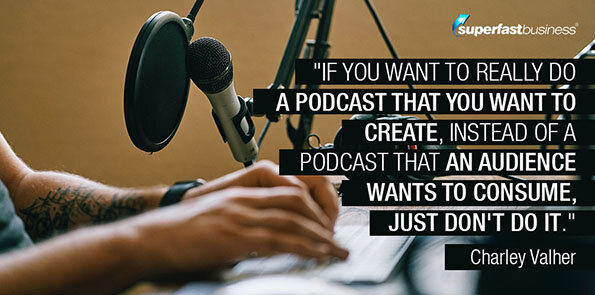
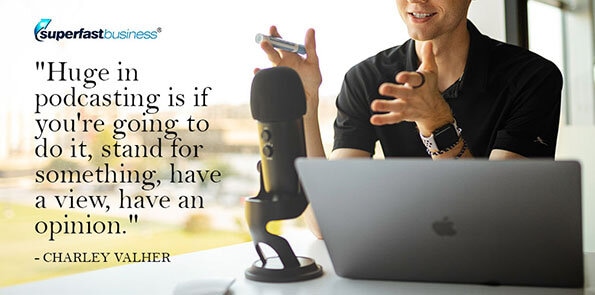
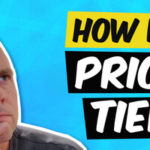
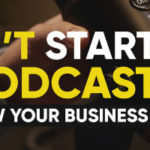
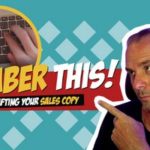
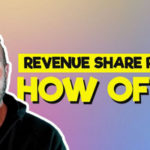





Leave a Reply